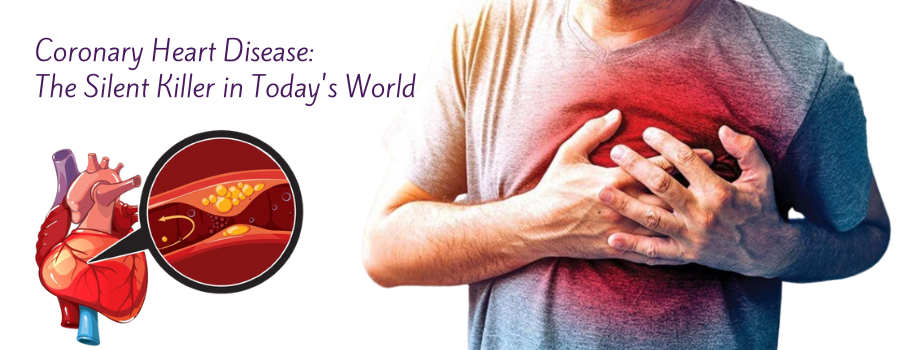Coronary Heart Disease: The Silent Killer in Today's World

Ali
Posted: 2023-10-08 12:16:11
About:
Coronary heart disease (CHD) is a severe, life-threatening condition that has earned the reputation of being a silent killer. It is the leading cause of death worldwide, and its prevalence continues to rise in today's world. CHD occurs when the coronary arteries, responsible for supplying blood, oxygen, and nutrients to the heart muscle, become narrowed or blocked due to the buildup of plaque. This article will delve into the causes, risk factors, symptoms, prevention, and management of this silent killer.
Understanding Coronary Heart Disease Coronary heart disease is a chronic condition that develops over time. The main cause is the accumulation of plaque in the coronary arteries, leading to reduced blood flow and oxygen supply to the heart muscle. This can result in various cardiovascular complications, including heart attacks and strokes.
Risk Factor:
Risk Factors for Coronary Heart Disease Several risk factors contribute to the development of coronary heart disease. These include age, gender, family history, high blood pressure, high cholesterol levels, smoking, obesity, diabetes, and a sedentary lifestyle. It is essential to identify these risk factors to prevent or manage the disease effectively.
Symptoms:
Symptoms of Coronary Heart Disease Coronary heart disease may not always present noticeable symptoms, hence earning its reputation as a silent killer. However, some common symptoms include chest pain or discomfort (angina), shortness of breath, fatigue, palpitations, and dizziness. Understanding these indicators is vital for early identification and intervention.
Prevention:
Prevention and Lifestyle Changes Prevention plays a significant role in combating coronary heart disease. Adopting a health-focused lifestyle is crucial for reducing the risk of encountering this condition. This includes maintaining a balanced diet, regular exercise, managing stress, quitting smoking, limiting alcohol consumption, and maintaining a healthy weight. These lifestyle changes significantly contribute to a healthier cardiovascular system.
Diagnosis:
Diagnostic Methods for Coronary Heart Disease Several diagnostic tests help identify and evaluate coronary heart disease. These include electrocardiograms (ECG), stress tests, coronary angiography, and cardiac imaging techniques such as echocardiograms and cardiac MRI scans. Swift recognition and precise diagnosis are pivotal for the effectiveness of treatment.
Treatment:
Treatment Options for Coronary Heart Disease The treatment approach for coronary heart disease depends on the severity of the condition. Lifestyle modifications, medication, and medical procedures are common treatment options. Lifestyle changes include dietary adjustments, exercise programs, stress management, and smoking cessation. Medications may include statins, beta-blockers, antiplatelet drugs, and angiotensin-converting enzyme (ACE) inhibitors. In critical situations, medical procedures such as angioplasty, stent implantation, or coronary artery bypass surgery may become necessary.
Psychological Impact:
Psychological Impact and Support Coronary heart disease not only affects physical health but also has a significant psychological impact on individuals. It can lead to anxiety, depression, and a reduced quality of life. It is crucial to provide emotional support, counseling, and access to support groups for individuals and their families to cope with the challenges of living with this condition.
Conclusion:
Conclusion: Coronary heart disease remains a silent killer in today's world, posing a significant threat to global health. Understanding the causes, risk factors, symptoms, Prevention and management of this condition is crucial for early detection, effective treatment, and improved quality of life. By adopting a healthy lifestyle, managing risk factors, and seeking appropriate medical care, individuals can empower themselves to combat this silent killer and live a heart-healthy life.













